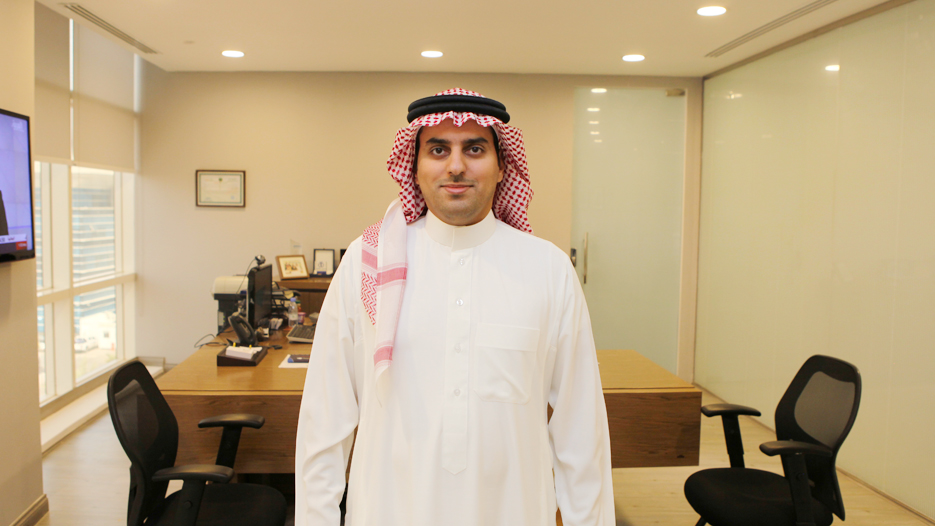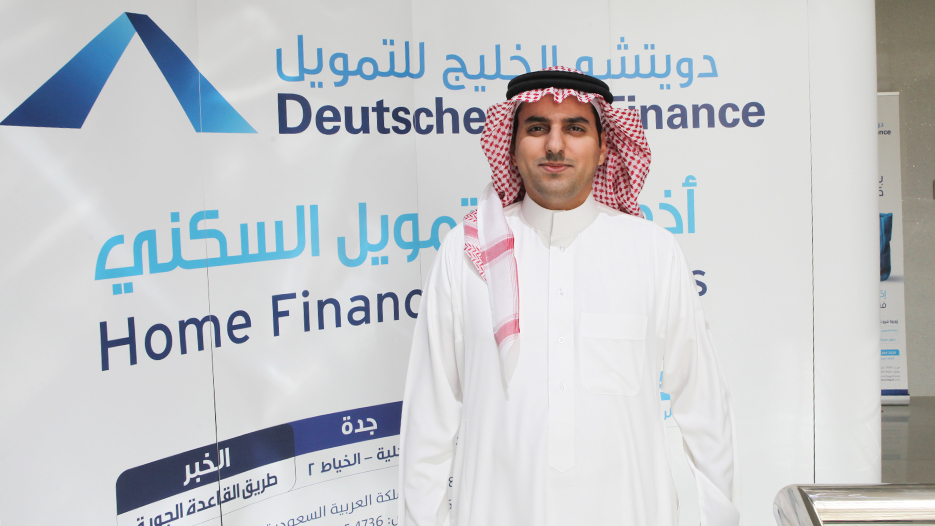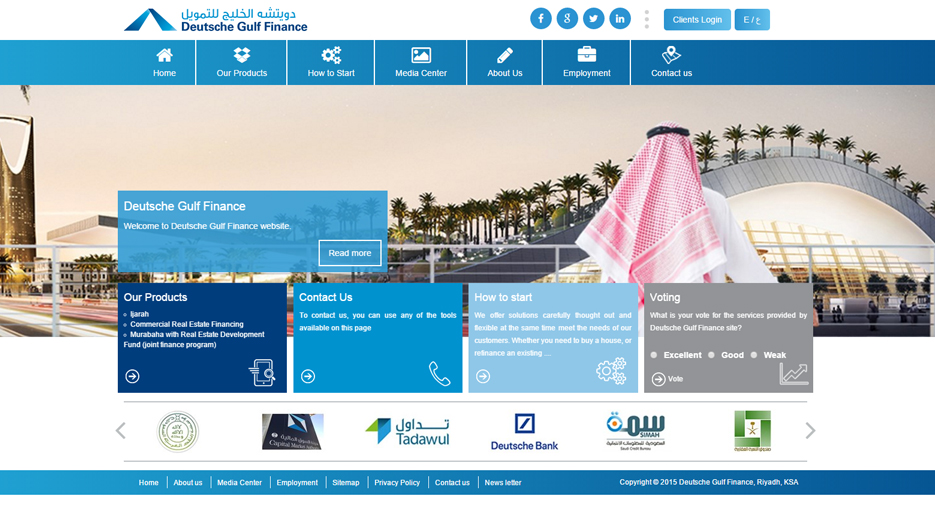Gulf Deutsche Finance on future of mortgage market in Saudi Arabia
According to the latest SAMA records the total mortgage size in Saudi Arabia is more than 100 billion riyals, coming mainly from the commercial banks. This represents only the official figures excluding Real Estate Development Fund (REDF) financing. If you compare this number to the consumer finance and other corporate finance products, it is very small. The reason is that the population of Saudi Arabia is viewed as a young population and mortgages are now something that is becoming a necessity for people in Saudi Arabia because of their gradual ageing.
Interview with Naif Abdulmohsin Al-Baz, CEO of Deutsche Gulf Finance

There is a lot of space for mortgages in Saudi Arabia; it is a young market and home finance only accounts for 5% of total bank credit. What is the overall environment for mortgages in Saudi Arabia?
According to the latest SAMA records the total mortgage size in Saudi Arabia is more than 100 billion riyals, coming mainly from the commercial banks. This represents only the official figures excluding Real Estate Development Fund (REDF) financing. If you compare this number to the consumer finance and other corporate finance products, it is very small. The reason is that the population of Saudi Arabia is viewed as a young population and mortgages are now something that is becoming a necessity for people in Saudi Arabia because of their gradual ageing.
If you think about the average age of the population five years ago, it was younger than it is today. As we go into the next five years you will find that the average age of the population has advanced and the need for home financing will increase. This represents an opportunity for local banks and financing companies for mortgage financing. All of these economic incentives make the mortgage financing and home residential financing business attractive in Saudi Arabia, supported by a good average GDP.
There is a lot of development in this sector, for example the 30% down payment and also the new mortgage law. All of these developments have slowed down the sector, and the reason SAMA has done this is because they don’t want hot money, they want to be conservative and prudent yet in the developed market the down payment is about 10%. In your opinion, what do you think about these developments? Should SAMA reduce this down payment?
Because of the mortgage crisis in 2008 and what happened mainly in the US, SAMA saw that it was important to regulate the industry and avoid having over inflated prices that can cause defaults within the mortgage sector. It was very important for SAMA to implement the 30% down payment requirement for mortgage financing to avoid such bubbles in the future.
It is also becoming a trend within the developed economies for regulators to impose a minimum down payment with respect to mortgage financing in order to avoid defaults in the future and having issues with respect to down payments and over inflated housing prices. In Saudi Arabia for example it is good to regulate this business with the implementation and introduction of the 30% down payment.
At the beginning it will cause some slow down with respect to the growth of the mortgage sector, however over the medium to long term this will correct itself and we will see more supply in the market that will match the demand and affordability of the clients in Saudi Arabia. Over the long term we should have a stabilised economy backed by a healthy mortgage environment. What SAMA did by introducing the 30% down payment was the right decision to avoid any issues in the future.

Another issue is the default on loans. Do you see any developments?
There has been a major development with respect to the Saudi Court system and SAMA. The foreclosure is becoming gradually clearer in Saudi Arabia and we have seen cases where we have had the implementation of courts making decisions against people who are leasing housing in Saudi Arabia.
We need time to see the performance of the portfolio in the mortgage business and to see what is going to be happening in the future and what will be the real reaction in the market for the foreclosures.
Traditionally the banks would provide financing but in the developed markets it is the specialised financial institutions such as yourself that provide the mortgages. How sophisticated is the Saudi Arabian market and what do you think will happen in the future? How is this industry going to be structured?
With the new regulations from SAMA we have seen four major mortgage residential housing financial companies entering in the market beside the 12 banks. As the mortgage industry becomes mature, the specialised mortgage financial companies will dominate under the originate to sell strategy model where they are going to originate in the market and sell these assets to banks and investors in the future.
We need time for the mortgage industry to mature and become more efficient. At DGF this is what we have started. The company has an originate to sell strategy and we have been able to sell assets to banks and investors. For instance, DGF has sold around 40% of what it has originated. With the introduction of the real estate refinance company by the PIF Private Investment Fund, the market will be heathier and more liquidity will come to the system.
Thus, the real estate refinance companies will be the ultimate buyers of assets in the future beside the commercial banks as the primary vehicles for liquidity.
How would you describe your performance in this market? Are you happy with your performance and the amount of mortgages that you are able to originate?
Today we are originating but we have limited capacity with respect to originating given the circumstances in the market and the liquidity of course. We are not like the banks, we don’t have deposits from clients so we depend on our capital and we depend on the standby warehouse facility from banks and the sale of assets to investors. We are also exploring the issuance of SUKOK (corporate bonds).
The shareholders so far have been satisfied with our performance however, there are some issues that need to be cleared up in the industry with respect to the Zakat treatment. This is a pressing issue in the industry and SAMA is now getting in and trying to resolve it.
However the outlook is bright for the future and as we increase our originations and we build a portfolio, the return on the equity should be satisfactory to the shareholders and we anticipate going IPO in the near future.

Your major shareholder is Deutsche Bank which is one of the largest banks in the world. What sort of advantage does that give you over other companies?
Deutsche Bank has contributed a lot to the company, especially at the beginning when the company was established, for example the infrastructure of the company, the technical service and the knowhow were brought by Deutsche Bank.
Of course when you go with Deutsche as a major shareholder in Saudi Arabia it can add value with respect to many stakeholders such as the banks because we depend on bank financing and so having Deutsche Bank as one of our shareholders can add credibility to the company. Of course they contribute to the credit and performance of the portfolio.
In terms of the value of mortgages that you originated compared to the year over year, has there been significant growth or a slowdown?
During the 5 years in existence, the company has witnessed growth year over year. However, this year because of the circumstances in the country with respect to the 30% down payment requirement and the talks about the future outlook of real estate prices, we have witnessed a flat growth this year compared to last year.
Given the new regulation, the response from the market is positive. It remains unaffected because of the sound fundamentals. The major issue in the market is limited supply of residential units; there are not a lot of developments that can cater for certain demand in the market. Future supply will come online in the future. Many plans are under review with the Ministry of Housing. We are counting on the Ministry of Housing decisions with respect to growing the supply in the market and trying to help the real estate developers in Saudi Arabia in order to meet the huge growing demand in the market.
Saudi Arabia’s affordable homes policy has been very confusing. The government has announced several times that they are going to build half a million units but then they scraped the plan. Therefore private developers haven’t entered the market because they don’t want to compete with the government and so there is a tremendous lack of properties that are between the ranges of 300,000 to 800,000. What you find is a lot of properties for 1.2 million for which the down payment becomes very difficult to achieve. Also, you have a huge waiting list for the financing from the Real Estate Development Fund; it is about 19 years. There is also a maximum of half a million so it is unaffordable for people to buy properties within the 800,000 mark.
The real estate and housing industry cannot be solved in one year. It is a strategic plan for the government. The government is putting in a lot of effort and coordination with the private sector and the Central Bank in order to promote the housing sector in Saudi Arabia.
There are signs in the market that the housing issue will be resolved within a few years. Saudi Arabia has a clear gap between demand and supply. We think that this supply is going to be gradually built to cover the demand in Saudi Arabia. We have seen changes with respect to the Ministry of Housing however we think that there will be solutions coming from different government entities that can promote the housing sector. It needs all parties´ cooperation, the government the private sector and the people.
Do you think that taxing the white lands is a good initiative?
This is one of the initiatives however we cannot assess the value of the implementation or the mechanism itself. The real solution is going to be the efforts to promote the supply and the development of the affordable housing in Saudi Arabia rather than implementing physical policies. It is really the investment and how the government is going to promote the real estate and housing investment to meet the demand.
What are your strategic priorities? Where would you like to see the company? Would you like to be the market leader or would you like to focus on profitability?
Deutsche Gulf Finance has been able to increase the market share to 5% in 2015. The plan is to increase it to 10% by 2018. The business development strategy is to open new branches, to date the company is present in the major cities such as Riyadh, Jeddah and Khobar. Long term plan is to go public and attract some public shareholders. There is an ongoing discussion with SAMA regarding floating the company and soon we will approach the CMA to get the licence to get into the Saudi stock market.
This 5% is from the overall mortgage originated in 2014?
This is actually 2015 according to the second quarter figures published by SAMA. Again, these are also approximate figures, because SAMA does not include other non-official financing so when we compare our originations to the figures published by SAMA we have around 5% market share. Our challenge is to grow and double this number within the next three years.
It is a great number considering all the giant banks that exist in the market.
Absolutely. Again, you mentioned at the beginning that in Western markets and more mature markets you see that real estate financing companies are the major originators in the market and they package the assets and sell them to the banks. This is the business model; to build and manage strategic relationships with the banks in Saudi Arabia.
Why what ways are you better than the banks in originating mortgages?
Deutsche Gulf Finance is a specialised real estate company; experts in home financing. Banks offer a plethora of products such as credit cards, current accounts and personal loans. Our company is a pure play in real estate financing and specifically in home financing so our sales people are experts in home financing. They would easily answer the questions from potential clients unlike the banks who are interested in selling other products.